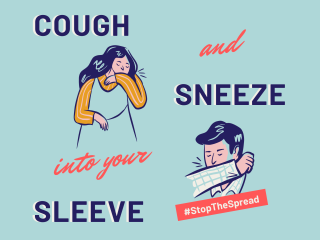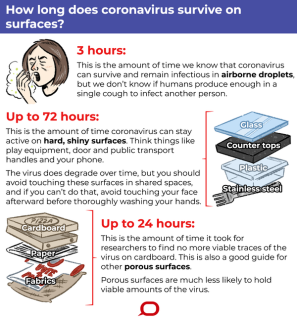
Coronaviruses belongs to a large group of viruses which can develop into more serious illnesses. More often than not, these viruses have mild or even zero symptoms, however, they can also be the cause of very serious respiratory conditions.
First identified in China, the novel coronavirus COVID-19 has spread between people very quickly.
Depending on the coronavirus type, most symptoms are similar to a regular flu including fever, coughing, fatigue and shortness of breath. In more severe cases, it can cause difficulty in breathing, chest pain or pressure. In certain cases, the disease may progress to pneumonia, multi-organ failure, and ultimately death.
One of the most efficient ways of reducing the risk, is to wash your hands often and regularly. When done correctly, a thorough hand wash will help remove viruses from your skin. Wash your hands under hot running water, with soap, for not less than 20 seconds. You can also use hand sanitizers, but remember a sanitizer must contain not less than 70% alcohol.
Keep at least two metres away from other people, especially with such symptoms as cough, sneezing or flu. Coughing or sneezing causes the spread of microscopic particles which can contain viruses and as a result infect people nearby.
Practice coughing and sneezing etiquette
Always cover your mouth and nose with a tissue or
 your elbow when coughing or sneezing. Place your used tissue in the waste immediately. Never cough into your hands or open air as that can spread viruses further.
your elbow when coughing or sneezing. Place your used tissue in the waste immediately. Never cough into your hands or open air as that can spread viruses further.
So far there is not enough evidence that regular face masks can be used as an effective measure against the virus. However you can still use it as an additional Personal Protective Equipment when looking after people suspected of having contracted COVID-19 or when coughing or sneezing.
Regularly check for the latest updates and developments from reliable sources including government institutions, HSE and World Health Organization. It is vital to only follow official COVID-19 information guidelines.

Sandyford Healthcare Medical and Dental is a modern new healthcare facility located in Sandyford, Dublin 18. The clinic also offers patients specialist medical consultation including Physiotherapy, Cardiology,...
The following Cookies are used on this Site. Users who allow all the Cookies will enjoy the best experience and all functionality on the Site will be available to you.
You can choose to disable any of the Cookies by un-ticking the box below but if you do so your experience with the Site is likely to be diminished.
In order to interact with this site.
To help us to measure how users interact with content and pages on the Site so we can make
things better.
To show content from Google Maps.
To show content from YouTube.
To show content from Vimeo.
To share content across multiple platforms.
To view and book events.
To show user avatars and twitter feeds.
To show content from TourMkr.
To interact with Facebook.
To show content from WalkInto.